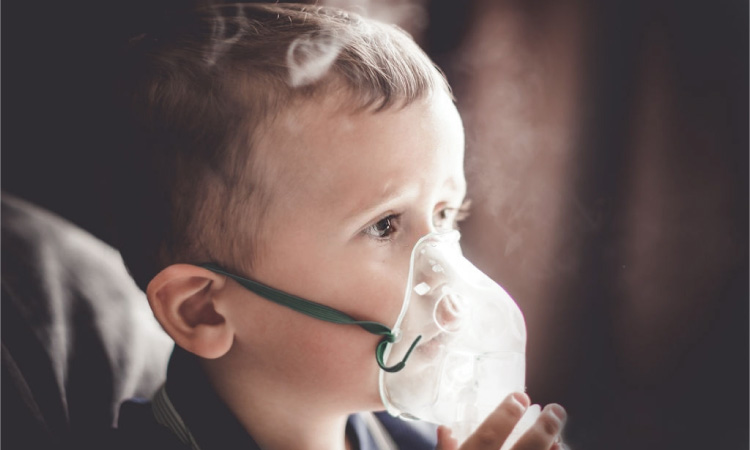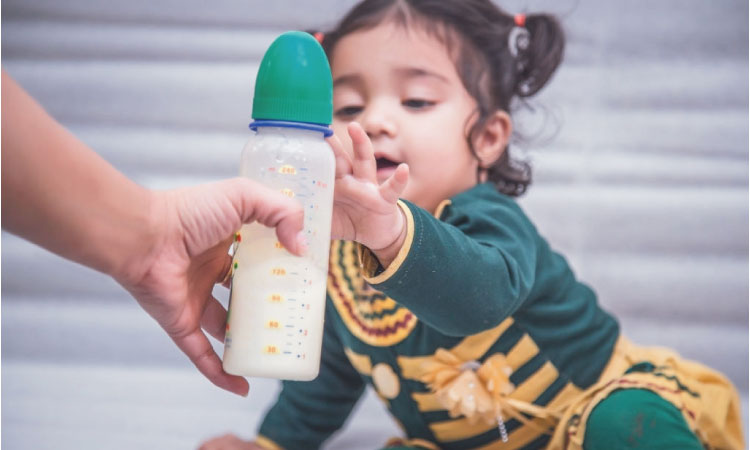Motherhood comes with many choices and decisions to make regarding childcare. After the baby is. welcomed in this world, one of the first decisions you have to make is how to feed your baby. It is generally agreed that breastfeeding is preferred and offers many. benefits to both the mother and the baby. However, bottle feeding a baby is not uncommon as well, despite the fact that we have heard that there are many disadvantages of bottle feeding. Whether you choose breastfeeding or bottle feeding-it is entirely your personal choice and neither is right or wrong. However, in this particular article, we will be discussing the disadvantages of bottle feeding a baby.
So what are these disadvantages exactly? Is breastfeeding really better? Is bottle feeding safe for a newborn baby? Learning the potential side effects of bottle feeding will help you make an informed decision. The following article sheds light on the above questions.
9 Science-Backed Disadvantages Of Bottle Feeding A Baby
Whether you choose to bottle feed your baby pumped milk or formula, the fact remains that he act of nursing creates an intimate bond between a mother and her baby. It is at this point that skin-to-skin contact that enhances the emotional bonding is established between the mother and the baby. Bottle-feeding may impede this bonding process.
Here are nine science-backed disadvantages of bottle-feeding your child:
Related Reading: 6 Benefits And 5 Concerns Of Comfort Feeding
1. Bottle feeding interferes negatively with oral-facial development
In infants, feeding methods influence jaw growth. As the child breastfeeds, the lips close, and the tongue positions in the palatal region of the central incisors. Breastfeeding ensures nose breathing because the tongue muscles are so active and prevent air from passing through the mouth1.
However, when a baby is bottle-fed, the tongue only controls the milk flow. As a result, the tongue tends to rest in the wrong place. As a result, air enters the mouth, compromising nose breathing. According to studies, bottle feeding affects oral-facial development in children. Prolonged bottle-feeding increases the odds of developing an open bite and posterior crossbite2.
The buccinator muscle is the major facial muscle underlying the cheek. This muscle is the muscle responsible for obtaining milk from the bottle. As a result of prolonged bottle feeding, the muscle becomes overdeveloped. This in turn leads to disproportionate growth of the maxilla and mandible.
This imbalance not only causes crossbite and dental crowding, but may also have cumulative effects on the face, including excessive narrowing of the maxilla, palate atresia, and septal deviation. Thereby, compromising the external appearance and function of the nose.
It has been found that babies who are breastfed display better dental arch development and have a lesser incidence of dental occlusion disorders than those who are bottle-fed3.
Related Reading: 21 Breastfeeding Tips For First Time Mothers
2. Increased risk of pyloric stenosis

Pyloric stenosis is a condition that affects the infant’s gastrointestinal tract. Pyloric stenosis is a type of gastric outlet obstruction, i.e., a blockage between the stomach and intestine.
A baby with pyloric stenosis throws up forcefully. Typical of Pylotic stenosis is projectile vomiting, in which breast milk or formula is forcefully expelled from the mouth in an arc, sometimes over several feet.
The condition is often accompanied by other complications, such as dehydration in babies. Dehydration in babies necessitates immediate medical attention. Studies show that infants who are bottle-fed experience a 4.6-fold higher risk of PS than those who are not.
3. Risks of indigestion and gastroenteritis associated with bottle feeding
Indigestion and gas are common among bottle-fed babies. Apple juice as well as orange juice are both used for constipation in babies. Bottle-fed infants are also at greater risk of gastroenteritis and diarrhea. Studies show that bottle-fed infants have a 2.8 times higher risk of developing GI infections than exclusively breastfed infants4. There is a higher incidence of diarrhea in bottle-fed infants (compared with exclusively breastfed ones), primarily due to improper sterilization of the bottles5.
4. Bottle feeding is linked to ear infections
Bottle-fed babies are more likely to suffer ear infections. A negative pressure is generated in the oral cavity when babies are fed by a bottle. When liquid is removed from the bottle, a negative pressure is generated in the bottle as well. This intraoral negative pressure can reach the middle ear via the eustachian tube, resulting in earaches in babies.
Similarly, studies have shown an increased incidence of acute otitis media among young children who are introduced to infant formula during the first six months of life. In fact, the odds are doubled among bottle-fed babies.
5. Bottle-feeding and the risk of obesity in later life
It has recently been proven that childhood and adult obesity is linked to the formula feeding of infants. Obesity is one of the side effects of prolonged bottle feeding. Several studies have found that children who don’t stop drinking from a bottle by their second birthday are more likely to be obese by the age of 5.5.
Furthermore, breast-fed adults are less likely to be overweight or obese than those who were formula-fed as infants. To prevent tooth decay and obesity, many doctors recommend weaning around the child’s first birthday.
Related Reading: 13 Common Foods For Weight Gain In Toddlers
6. Negatively impact immunity
Breast milk boosts your baby’s immune system6. Formula milk lacks many of the unique essential nutrients found in breastmilk. According to studies, bottle-fed infants are more likely to develop allergies, diarrhea, and infections than exclusively breastfed infants. Due to inappropriate sterilization of feeding bottles, bottle-fed babies may also develop chest infections, urine infections, and diarrhea.
Related Reading: Top 10 Benefits Of Breastfeeding For Moms
7. Bottle feeding can cause respiratory issues

Bottle-fed babies are also more prone to respiratory issues. Chronic respiratory symptoms may be caused by prolonged bedtime bottle feeding, claims one study. The risk of asthma and recurrent wheezing in babies increases by the age of five, if you bottle-feed them in a bed or crib before bedtime during the first year of life.
8. Bottle-feeding equipment can affect a family’s monthly budget
It can be expensive to bottle-feed your baby. A bottle, a cleaning brush, and a sterilizer are all necessary if you plan on feeding formula milk to your child. Additionally, replacing old bottles and nipples with new ones at the right time is essential. You must also invest in a good breast pump (in case of bottle feeding breast milk) or good branded formula milk powder if you are to bottle feed the baby. The added costs can add up to more than you would expect.
Related Reading: 6 Things You Will Need For Breastfeeding
9. Bottle feeding is less convenient and takes a lot of effort
Feeding bottles must be thoroughly sterilized and cleaned regularly. Inadequate sterilization can harm your baby. Bottle-fed babies have a high risk of infection since microorganisms can stick to the neck and teat of the bottle and be passed onto the infant when the bottle is reused without proper sterilization.
You can breastfeed your baby whenever you want. On the other hand, it takes time and effort to prepare milk for bottle-feeding. You should wash and sterilize the bottle before you bottle feed the baby. Making the formula at the right temperature also takes time.
The joy of traveling can also be impacted by bottle feeding. While traveling with bottle-fed babies, you will need to bring clean bottles, formula milk, nappies, and other necessities. In addition, bottle feeding is not convenient if your baby requires midnight feedings since you have to get up every time to prepare milk.
Even with the best sterilization methods, a bottle-fed baby is at a higher risk of catching diseases such as diarrhea and respiratory infections than a breastfed one.
Is Bottle-Feeding Safe For A Newborn Baby?
Most mothers and specialists agree that breastfeeding is the ideal option for a newborn. However, this is not always possible or practical. So when is bottle feeding safe for a newborn baby?
You do not need to stress yourself too much wondering “is bottle feeding safe for a newborn baby”. Usually, despite the potential disadvantages, bottle-feeding is safe for a newborn, as long as proper precautions (such as sterilization) are followed. However, if you need to bottle-feed your baby before they are 2-4 weeks old, it would be wise to first get advice from a lactation consultant.
There is no definite amount of food the baby should have, as it is different for each child. However, the average newborn has around 45-90 ml milk every 2-3 hours. Of course, as the baby grows, the amount of milk they drink increases. If you bottle-feed your baby, the feeding should take around 15-20 minutes. If they are able to finish the bottle sooner, chances are high that the flow of the bottle is too fast. If the baby takes longer, then the flow is likely too slow.
Thus, it is important to pay attention to the baby feeding bottle and nipple you choose. You also need to buy enough bottles to cover all the feeding times of the baby. Buying around 4-6 bottles and nipples is a good start. Also, make sure you respond to your baby’s cues about their hunger.
If you do all that, then the answer to the question “is bottle feeding safe for a newborn baby” is probably a “yes”.
Related Reading: 9 Biggest Challenges Of Breastfeeding No One Prepares You For
Conclusion

Like anything else, bottle feeding comes with its own advantages and disadvantages. It is up to you to do your research and make your decision. The main aim is to make sure your baby gets the right amount of food with the right amount of nutrients. Since each baby is different, it is impossible to say for sure which will work better for you. Hence, any new mother should take note of the benefits and potential risks before bottle-feeding the baby.
FAQs
Whereas breastfeeding requires active feeding from the baby, bottle-feeding does not require much effort. So if you introduce the bottle to the baby, they will not be able to breastfeed properly.
Hence, occasionally bottle-feeding your baby can lead to what is known as “nipple confusion”.
When entering into motherhood, many women often wonder if their babies are eating enough and receiving enough nutrients.
However, there is no need to stress over this, as there are many signs that point to them eating enough. If they seem full after feeding and they have regular and healthy bowel movements and urination, they are probably eating enough.
It is possible to overfeed a baby. However, it is also very rare. This is because babies are naturally able to self-regulate and decide how much they feed.

